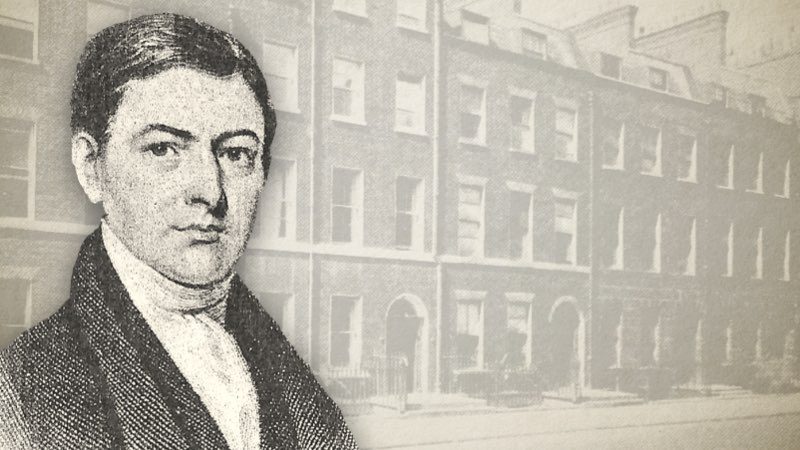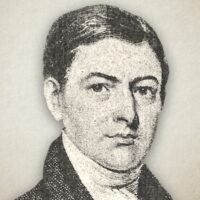
Gracious Words
“And I will turn Mine hand upon the little ones.”—Zechariah 13:7
The former part of the verse speaks of the Shepherd, which is Christ, the Good Shepherd (John 10:14), and of the sword awaking against Him at the command of Jehovah the Father. Here is shown the rights of Justice: He will by no means clear the guilty. Jesus took on Himself the sins of His elect; He became as a sinner in the view of Justice: He was considered as the law-breaker, and must bear the punishment due to transgressors, as Isaiah 53:5, “He was bruised for our iniquities,” &c., &c., to the end of the chapter.
Sins, in Scripture, are called debts. God the Father is represented as our Creditor; and we are debtors, and are by Adam’s debts (which are transferred to us), and by our own debts, become quite ruined, and must of necessity be shut up in the prison of an eternal hell, for anything we can do to help ourselves. We are cursed by the law of God for our departure from its right rules, which are holy, just, and good; we are in alliance with the devil, do his commands, act under his diabolical influence, and are enemies to God by wicked works. This is every man’s condition by nature, dead in trespasses and in sins. Reader, if the Almighty hath shown you what you are, if He hath led you to Horeb, and you have heard the voice of words, your boasting is at an end. Your righteousness appears filthy rags. Your comeliness is turned into corruption. Can you help yourself? Can you draw near to God upon the ground of works? Can you extenuate your crimes? Can you subdue sin? Can you work up your heart to love God? I am certain that you cannot do any of these things. Neither can you believe, for working for life ends when believing begins. The burdened conscience finds relief when faith is given to lay hold of God’s strength, and not till then.
Christ is the appointed Surety for His elect. The Father who appointed Him looked to Him for the payment of our debts, and our debts He fully paid, declaring with His last breath, “It is finished.” Upon the ground of this finished work of Jesus all the elect are accepted and for ever blessed, their debts all paid, and their redemption is for ever. As God the Father looked unto Jesus, so must a guilty sinner look to Him also, or go into black despair. “There is no other name under heaven given amongst men whereby we can be saved.” The little ones in the text are God’s elect family, who are frequently called lambs—and called a little flock, and a very small remnant. The largest visible body of saints that were ever upon the earth at one time, were but few compared with the number of those who were strangers to God.
And when I reflect on the doctrine preached by some men, who tell us that God wishes all men to be saved, and has done all He could, and given them a fair opportunity to improve their talents, I am struck with a kind of horror at such awful reflections upon the perfections of the Most High. [Although God declares “I have no pleasure in the death of the wicked” (Ez. 33:11), yet salvation “is not of him that willeth, nor of him that runneth, but of God that showeth mercy.”]
It is a most consolatory truth that the Lord will not reject or despise the sinner, early or late, who calls upon Him, and returns to the Most High. But let it be remembered no man can turn to God, or seek the face of God, till sought out of God. If, therefore, I am a seeker of the Lord, if I call upon the Lord, be my case ever so deplorable, it amounts to a presumptive evidence that I am one of those whom the Saviour promises to gather. “For thus saith the Lord God, Behold, I, even I, will both search My sheep and seek them out. As a shepherd seeketh out his flock in the day that he is among his sheep that are scattered, so will I seek out My sheep,” &c. (Ez. 34:11-12). He turns His hand upon the little ones. Come, poor “little faith,” and behold the gracious promise of the Good Shepherd. Hath He not turned His hand upon thee? How couldst thou ever taste the sweetness of His promise if He had not turned His hand upon thee? How oouldst thou find a sweetness in thy meditations on His name and condescending mercy and love, if He had not sought thee out in the cloudy and dark day? There was a time when thou didst delight in banishing every thought of religion and Jesus Christ from thy thoughts, but now thy sorest grief is, that thou canst not say, “My Lord and my God,” or, “My Beloved is mine, and I am His.” This proves that His hand has been turned upon thee in mercy, and ere long He will set His hand a second time to work, and bring thee forth to light, and thou shalt behold His righteousness. His hand will subdue Thy stubborn unbelief, and drive the buyers and sellers out of the temple of thy heart, for such is His promise, “I will take the stony heart out of your flesh, and will give you a heart of flesh. I will pour my Spirit upon you, and you shall live.” And this is what the Redeemer means when He saith, “But the Comforter, which is the Holy Ghost whom the Father will send in My name, He shall teach you all things, and bring all things to your remembrance, whatsoever I have said unto you.” This Comforter will come in the name and power of Jesus, and lead out thy soul to a holy resting in the fulness of Jesus, therefore call upon His blessed name.
Henry Fowler (1779-1838) was an Independent sovereign grace preacher and hymn writer. In 1813, he assumed responsibility for a gospel work in Birmingham. He removed to London in 1819, serving as pastor of Gower Street Chapel. The original congregation met in a chapel on Conway Street, and were followers of William Hintington’s ministry. Upon Mr. Fowler’s acceptance of the call to serve as pastor, a new chapel was built on Gower Street. This chapel (now demolished) was the predecessor to the old Gower Street Memorial chapel on Shaftesbury Avenue.




